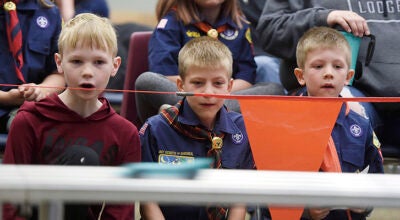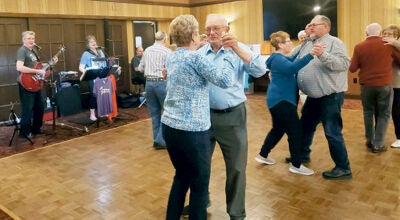Vet clinics adapting to COVID-19
Published 7:01 am Thursday, April 9, 2020

- Dr. Mike Sasse and veterinary technician Leslie Tabor look over Omi Tuesday afternoon at Willow Pet Hospital. Veterinary clinics across the United States are having to find new ways to tend to their four-legged patients. Eric Johnson/photodesk@austindailyherald.com
|
Getting your Trinity Audio player ready...
|
Like so many, veterinarians are having to find new ways of doing things when it comes to serving the health needs of our pets.
As healthcare institutions across the world are having to adapt to the change in care, so too are veterinarians, who have begun to put special procedures in place that will allow them to continue caring for animals, but protect the safety of employees and customers alike.
But some places are taking extra steps to ensure care is there in all facets. On Tuesday, in the lobby of Willow Pet Hospital, sat two large pallets of both dog and cat food — the beginning steps of a food pantry for pets.
Like a food pantry for humans, this food is set aside for people that have been placed in hardship because of the COVID-19 pandemic, either through loss of job or some other circumstance.
In the near future, a website — wwwaustinmnpetfoodpantry.org — will become available where people can go through the process to get the pet food they need.

Willow Pet Hospital has started a food pantry for pets that will help owners ensure that their animals will have food if they are going through hardships due to the COVID-19 pandemic. Eric Johnson/photodesk@austindailyherald.com
“That’s going to link them to a short application and then we’ll contact them and arrange for pick-up,” said Dr. Mike Sasse, co-owner of Willow Pet Hospital with his wife Dr. Sara Sasse. “There’s no charge to the person who is getting the food.”
However, while people may consider this pet food pantry to fill a need, Sasse stressed that in a time such as this, it’s important to help other places that sell pet food if possible.
“We have a lot of great places here in Austin,” Sasse said. “If you have the ability to buy food, we want people to shop at the local places.”
Like so many areas these days, it’s uncertain how long Willow Pet Hospital will continue the pantry, but it’s Sasse’s hope that it’s something that can go a little longer.
“I would like to keep it going,” he said. “We’re looking for sponsors to step up and help us with the financial end of it. If we can order enough food and there is enough to go around, we’ll continue.”
In the meantime, clinics like Willow Pet Hospital will continue to work through the pandemic, with altered ways of getting animals healthcare.
Vet clinics are putting restrictions in place dictating how pets are brought to the hospital, how medication is given out, and even putting off procedures that can be put off.
“If you walk up to our clinic, you’ll be met with a locked door,” Sasse said. “Call ahead for an appointment. When you get here, call and check in and we’ll put you on hold and switch you to a technician in triage.”
Vet technicians will come out and get the pet from the car and then bring it in for the examination, which will also include a treatment plan.
Much of the communication between doctors and patients will be done over the phone to cut down on face-to-face proximity.
At Willow Pet Hospital, most operational procedures have been put on hold, unless it’s an emergency, and things like spays and neuters and vaccinations, if possible, will also be put on hold, except for kittens and puppies.
Similar steps are being taken at Austin Veterinary Clinic.
“We’re still asking people to call to make appointments,” said Dr. Jocelyn Bell. “What has changed is we’re not allowing people in the building anymore. Let us know that they have arrived and we’ll have somebody come out and get the animal and bring the animal inside. Lots of times we’ll call them on the phone and discuss what we find.”
Both places are urging payment through credit card to avoid the transfer of cash and checks.
Much like hospitals, vet clinics are doing what they can to accommodate customers during this time, but they are also running into some of the same problems, including a lack of personal protective equipment.
“We’re having problems,” Bell said. “We were lucky to have some gloves on hand prior to everything that is happening, but we no longer can get the gloves.”
Austin Veterinary does, however, continue to do visits to farms.
“We’re still doing farm calls for large animals that obviously can not come to the clinic very easily,” Bell said.
And while they are not allowing people into their building, Austin Veterinary, is making allowances to those with pets at the end of their lives.
“That is the only time we let clients in is when they say goodbye,” Bell said. “It’s not as personal as it has been in the past, but we still let them say goodbye.”
These changes have been difficult for all parties involved, but both Bell and Sasse have said the experience they have had with clients has largely been positive.
“As a general public reaction, we have had a lot more positive feedback,” Bell said. “It’s been ‘thank you for keeping us safe,’ and not so much negative. On our end, it’s been nice to have the clients we have.”
“We’ve really had most people really excited about it,” Sasse said. “I think we were kind of early in the game. We saw what was happening in the Twin Cities. We have a fair amount of older, more vulnerable clients and they’ve been appreciative of putting steps in place.”
Clients are urged to call their clinics to determine the safety procedures they have in place.




